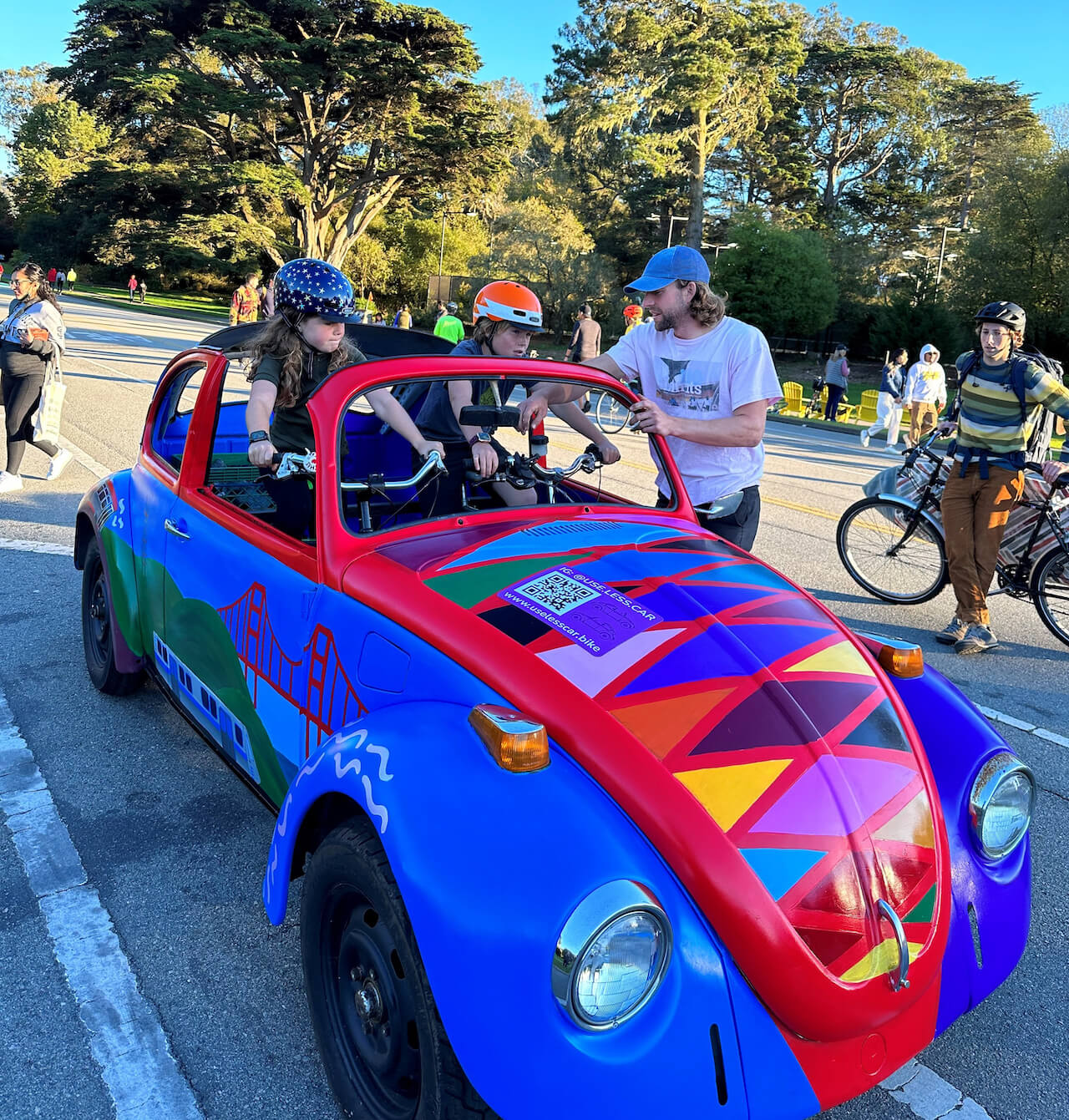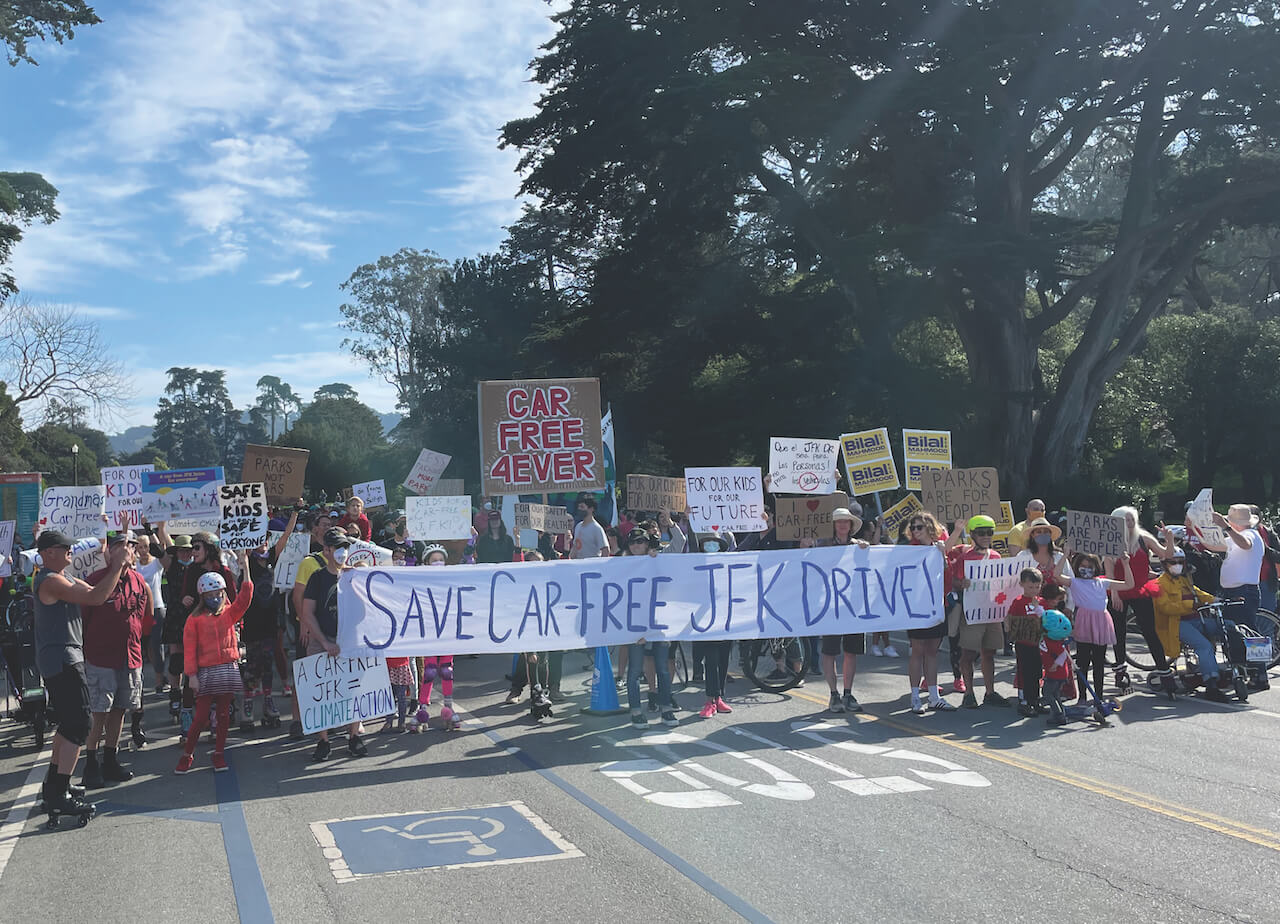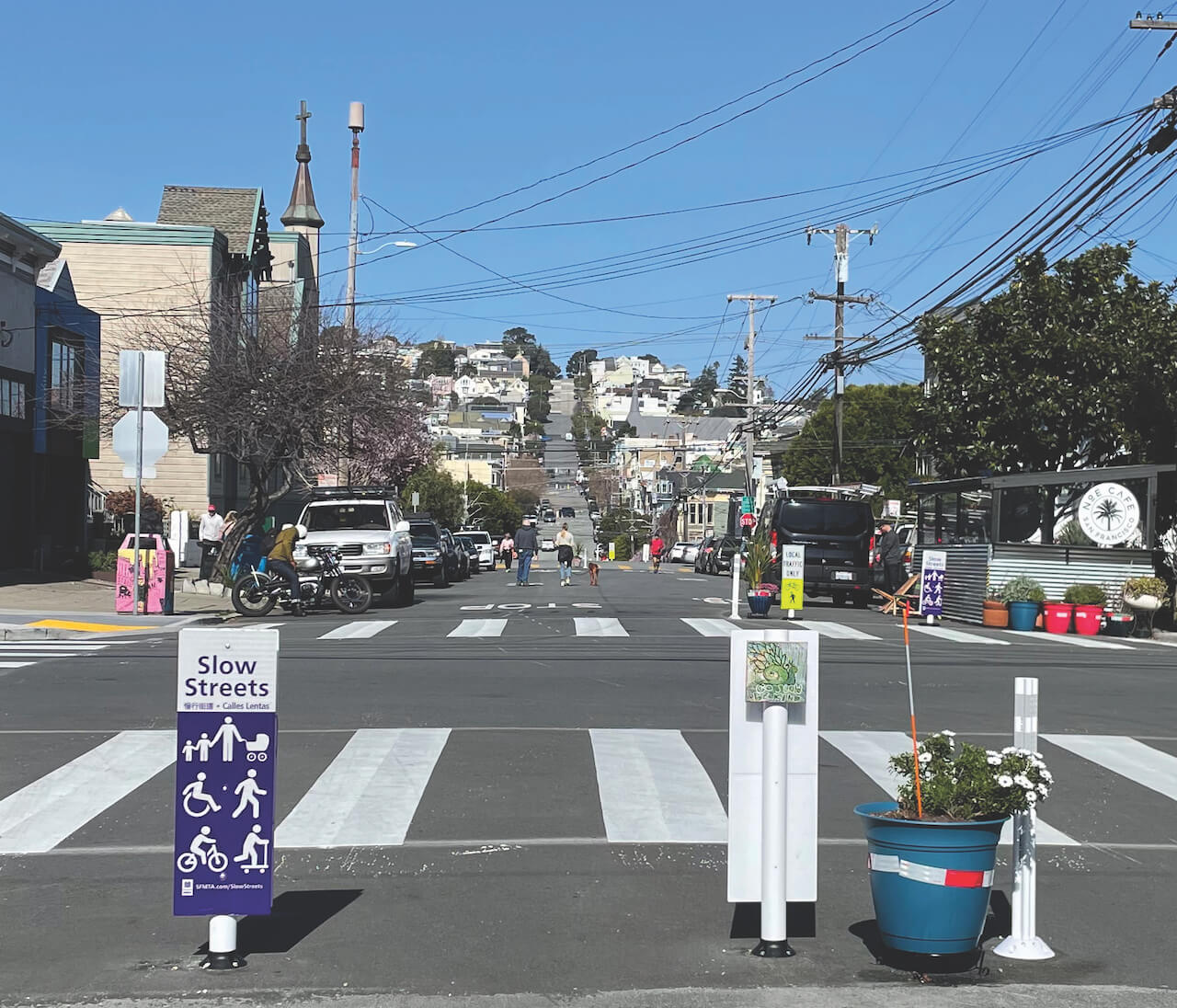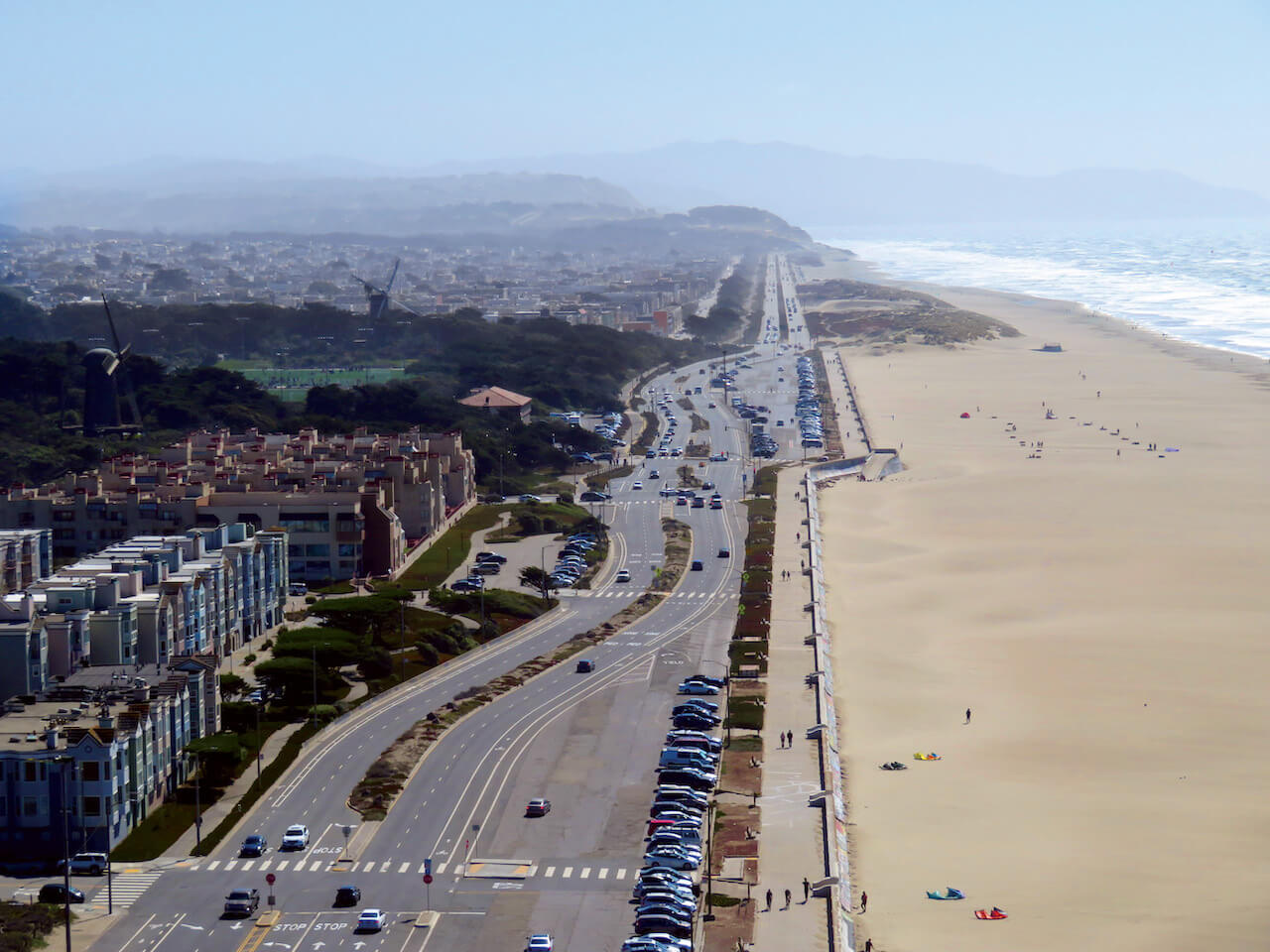Car-Free JFK: Initiative Battles in San Francisco and What They Forecast
By Kent Klaudt
In 2022, battles over whether parks belonged to people or cars came to a head in San Francisco. The de Young Museum’s leadership, unhappy with a decision to make JFK Drive a car-free promenade, launched an initiative battle. The fight, and the voters’ ultimate decision to put environmental and people-friendly policies first, help us predict future outcomes as we look at further steps toward safer road use for all.
 Children enjoy the pedal-powered “Use Less Car” on JFK.
Children enjoy the pedal-powered “Use Less Car” on JFK.
John F. Kennedy Drive (Promenade) background
The struggle for bicyclist rights in San Francisco parks began more than 100 years ago, and at the turn of that century, San Francisco became the first city in America to ban cars from its parks. Golden Gate Park was originally meant for bicyclists and walkers, and park leadership did what they could to prevent the growing automobile culture from dominating the park. The initial ban didn’t last long, however, and lobbying by the Automobile Club of America quickly led to a relaxation of the motorized vehicle ban. Cars were allowed to drive through the parks in daytime, with a speed limit of eight miles per hour. By 1907, however, speeding cars in San Francisco parks became such a problem that one park commissioner suggested shooting their tires out with buckshot.
The debates over motorist access to the parks never really ended, and since 1967 a portion of JFK Drive was closed to cars every Sunday, and on some Saturdays and holidays. In 2020, in the early days of the COVID-19 pandemic, the city closed JFK Drive to vehicle traffic seven days a week to increase the public open space available for socially distanced outdoor exercise.
In April 2022, the Board of Supervisors met to consider making JFK Drive permanently car-free. After nine hours of comment by 506 members of the public, the board approved the measure by a 7-4 vote. The story didn’t end there, however.
Propositions I and J
Later in 2022, two competing ballot propositions — I and J — renewed the debate over the future of JFK Drive. Proposition I proposed to reverse the Board of Supervisors’ action in April and allow cars on JFK Drive other than on Sundays and holidays and re-open the Great Highway to unrestricted access to motorists.
 Supporters of Proposition J. Photo: Mike Smith, co-founder of WalkSF.
Supporters of Proposition J. Photo: Mike Smith, co-founder of WalkSF.
Proposition J proposed to keep JFK Drive car-free and thus maintain the Supervisors’ April decision. The proposition was put on the ballot by four city supervisors: Matt Dorsey, Rafael Mandelman, Myrna Melgar, and Hillary Ronen. (The Municipal Elections Code allows four or more supervisors to place a city ordinance on the ballot in this manner.)
The arguments in favor of Proposition J noted that visits to Golden Gate Park had increased 36% over the period before the COVID-19 pandemic and that 70% of people surveyed approved of a permanent car-free JFK. Proposition J proponents also argued that JFK Drive was one of the city’s most dangerous streets when it was open to motorists — and particularly dangerous for children, seniors, people with disabilities, runners, walkers, and cyclists. The city’s largest park should not play host to a high-injury corridor used by commuters.
Prop J proponents also noted that San Francisco needed more protected open spaces without motorists, and that even with a car-free JFK, park access would not be hindered because of improved Muni transit service to the park, “over 5,000 parking spaces inside the park, 18 open roads to drive in/out of the park, a newly-built ADA accessible parking lot, and the City’s 21-point accessibility program”, and a new park shuttle running every 15 minutes along JFK Promenade, connecting all the major park attractions to Muni service.[1]
Prop I was largely funded by the Corporation of the Fine Arts Museums (the governing body of Golden Gate Park’s de Young Museum and the California Palace of the Legion of Honor in the Presidio.)
Prop J ultimately won with around 60% of the vote, thereby preserving the April 2022 decision by the Board of Supervisors. Proposition I lost by a similar margin. Important partners in the JFK Promenade victory for human-powered transit and car-free open spaces included Kid Safe SF, Community Spaces SF, the SF Bike Coalition, Walk SF, the Church of 8 Wheels, and others.
Slow Streets program
In a related victory, the San Francisco Municipal Transit Authority (“SFMTA”) Board of Directors voted unanimously in 2022 to make sixteen of the city’s slow streets permanent, thereby expanding space for walkers, runners and cyclists. This resulted from the efforts of many individuals and groups, including the slow streets “mayors” (volunteer leaders), Kid Safe SF, Community Spaces SF, the SF Bike Coalition, the SF Parks Alliance, Walk SF, and more.
 A Slow Street in San Francisco’s Noe Valley neighborhood. Photo: Nancy Botkin.
A Slow Street in San Francisco’s Noe Valley neighborhood. Photo: Nancy Botkin.
The Great Highway debate
The Great Highway was opened in 1929 and runs along Ocean Beach for almost four miles on the westernmost side of San Francisco. A two-mile portion of it between Lincoln Way and Sloat Boulevard is known as the Upper Great Highway. In the early days of the COVID-19 pandemic, this portion was closed to motorists and became, in effect, a 17-acre park providing additional outdoor recreational space for bicyclists, walkers, runners, skateboarders, people in wheelchairs or other mobility assistance devices, and outdoor social distancing-appropriate play-space for families with children.
An array of federal, state and city agencies oversees Ocean Beach and the Great Highway, which is classified as a recreational street in San Francisco’s General Plan. “Recreational streets” in San Francisco were intended to prioritize non-motorized traffic, and be used for slow recreational, “scenic” or “pleasure” driving. The Great Highway has been part of the city’s parks system since 1870 and the current four-lane roadway and coastal trail are under the jurisdiction of the Recreation and Park Department and are maintained by Public Works, while the traffic and surrounding street network is managed by SFMTA.
 San Francisco’s Great Highway at Ocean Beach. Photo: Pi.1415926535, courtesy of Wikimedia Commons.
San Francisco’s Great Highway at Ocean Beach. Photo: Pi.1415926535, courtesy of Wikimedia Commons.
Proposition I would have reopened the Great Highway to vehicle traffic seven days a week and would also have prevented the city from moving forward with plans to close the Great Highway between Sloat Boulevard and Skyline Boulevard to private vehicles.
In December 2022, the San Francisco Board of Supervisors voted to maintain the Upper Great Highway as a car-free promenade until the end of 2025, allowing for a three-year pilot study. This city ordinance preserves the current schedule of closing the road to motor vehicles on the weekends and holidays, while allowing motorists to use the road on weekdays.
The current status of the Upper Great Highway will allow the San Francisco Recreation and Park Department and SFMTA to collect more data concerning the Great Highway’s use as both a roadway and a promenade for human-powered travel and recreation, and SF Parks will, ultimately, use this time and research to make a recommendation to the Board of Supervisors regarding the Great Highway’s long-term future. In the meantime, an SFMTA report in 2021 noted that “[m]aintaining the Great Highway for vehicular use is costly and challenging and will become more so in the future with the effects of climate change and sea level rise.”
Why does it matter?
According to the San Francisco Recreation and Parks Department, nearly 7 million visits have been made to the car-free portion of JFK Drive (now Promenade) since it was closed to vehicles, and this is 36% more than before the closure. The recent victories for cyclists and other non-motorized transport in Golden Gate Park and the Great Highway, and the continuing slow streets program, demonstrate the political power of organized environmentalist-oriented, human-powered transit users and everyone else who desires more car-free open spaces in our cities. These recent struggles suggest that this will continue to be a block-by-block, initiative-by-initiative battle until we reach critical mass for climate change-appropriate transit solutions. Or, with apologies to John F. Kennedy, the park promenade’s namesake: ask not what your city can do for you, but what you can do for your city!
[1] San Francisco Voter Information Pamphlet and Sample Ballot, Consolidated General Election, November 8, 2022, Proponents’ Argument in Favor of Proposition J, by Kid Safe SF.
Inside this issue
Have you or someone you know been involved in a bicycle crash? Want to know about your rights? Are you a lawyer handling a bicycle crash who wants the best result for your client? Contact Bicycle Law at (866) 835-6529 or info@bicyclelaw.com.
Bicycle Law’s lawyers practice law through Coopers LLP, which has lawyers licensed in California, Oregon, and Washington state, and can affiliate with local counsel on bicycle cases across the country to make sure cyclists benefit from cycling-focused lawyers.
